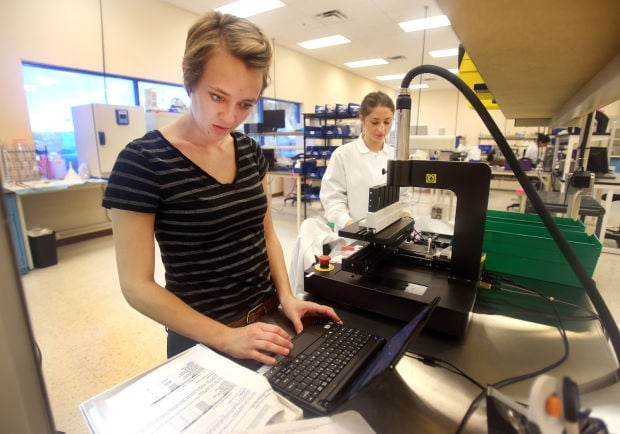Homegrown Tucson biotech company HTG Molecular Diagnostics Inc. plans to go public as soon as next week with an initial public stock offering expected to raise up to $60 million.
The initial shares will be priced at $13 to $15 per share and trade on the Nasdaq’s mid-cap Global Market under the ticker symbol HTGM, according to documents filed with the U.S. Securities and Exchange Commission and the IPO research firm Renaissance Capital.
HTG’s shares are expected to start trading on Thursday, according a listing Friday on the Nasdaq website, though IPO dates often shift.
An HTG spokesman said the company’s management cannot discuss the filing because of mandatory “quiet periods” limiting communications on public stock offerings.
Tucson is home to just a handful of publicly traded companies, and only two trade on major U.S. exchanges — social-services provider Providence Service Corp. and Accelerate Diagnostics Inc., a startup that has developed a bacterial detection and identification system. Both trade on the Nasdaq.
UNS Energy Corp., parent of Tucson Electric Power Co., was traded on the New York Stock Exchange until it was acquired last year by Canadian utilities giant Fortis Inc.
HTG says its patented chemistry technology, HTG EdgeSeq, can rapidly and simultaneously profile thousands of molecular targets from samples a fraction of the size required by current technologies. It is based on HTG’s proprietary Quantitative Nuclease Protection Assay, or qNPA, technology, which measures so-called messenger RNA at the molecular level.
Customers such as drug companies, academic institutions and molecular labs use HTG’s tests for translational research, drug development and molecular diagnostics. HTG’s current products are for research only, with use for patient diagnostics still subject to approval by the U.S. Food and Drug Administration.
In 2013, HTG’s Edge System won a Silver Award for in-Vitro Diagnostics in the 15th Annual Medical Design Excellence Awards competition.
HTG reported in January that it had raised $18 million in debt and stock options and warrants from 19 investors, and the company had previously attracted more than $25 million in venture-capital funding.
Venture investors have included Solstice Capital, which is headed by Tucson-based managing general partner Harry George, an HTG director; Phoenix-based Valley Ventures; and the investment arms of drug giants Merck and GlaxoSmithKline. The company also has had longstanding support from local investors including the Desert Angels.
HTG’s president and CEO, Tim “TJ” Johnson, is a former executive at Oro Valley-based Ventana Medical Systems, a University of Arizona diagnostics spinoff that is now part of Swiss drug giant Roche.
HTG employed 77 people at the end of 2014, according to regulatory filings.
The company now known as HTG was founded in 1997 as High Throughput Genomics Inc. by Bruce Seligmann, who had come to Tucson to head research at Selectide Corp., a University of Arizona spinoff. Selectide was later acquired and formed the foundation for Sanofi’s drug-chemistry center in Oro Valley.





